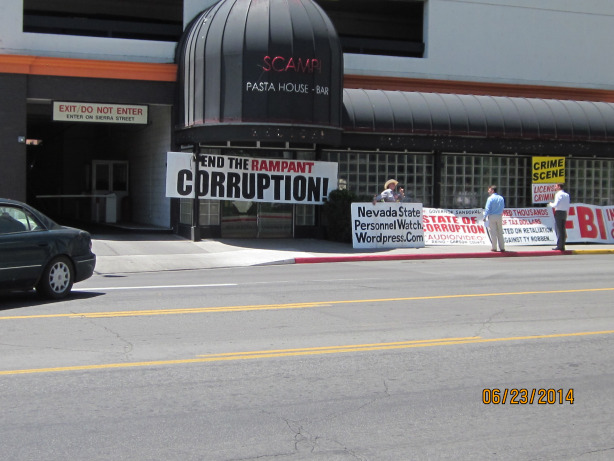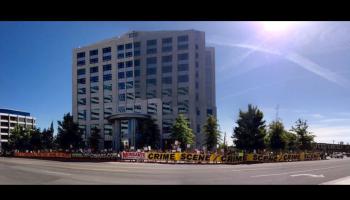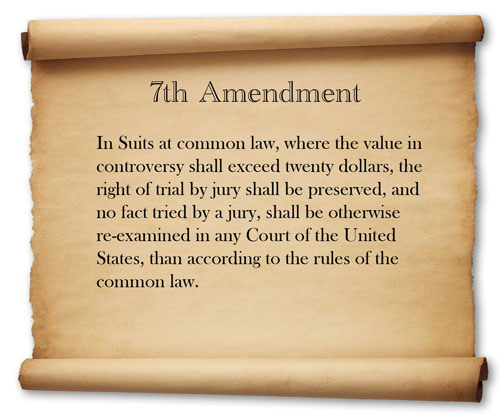| Online: | |
| Visits: | |
| Stories: |
Help Ty Robben and support the 7th Amendment “I demand my day in Court” protest coming to Reno Nevada August 2015.
Reno Nevada resident Ty Robben plans to demonstrate in the very near future about the Reno Federal Court and in particular, Judge Miranda Du’s use of summary judgement to dismiss certain causes of action in his civil rights lawsuit against various Carson City officials including former disgraced DA Neil Rombardo , his corrupt assistant DA Mark Krueger and corrupt Carson City justice of the peace “judge” John Tatro.
“I plan to stay in front of the Reno courthouse with my signs until I get my day in court” says Robben.
Ty Robben needs funding to bring “The WORLDS LARGEST CRIME SCENE TAPE” to the Reno Federal Couthouse where he want’s to display the signs ans use his 1st Amendnt rights to protest the violation of his 7th Amendment rights. See previous KOLO news story here: https://youtu.be/gbk0rKPnbfs

Ty Robben says “This is hurting me financially and preventing me from getting treatment for my dog Tytan who’s suffering from bone cancer. They destroyed me and my family and now I am going to lose my dog.”
Ty Robben says “This is hurting me financially and preventing me from getting treatment for my dog Tytan who’s suffering from bone cancer. They destroyed me and my family and now I am going to lose my dog.”
Those listed are Defendants’ in a civil rights lawsuit filed by Robben that includes a cornucopia of claims including malicious prosecution, defamation, RICO (racketeering), false imprisonment, false arrest, and virtually every Constitutional amendment a person can suffer from including the 1st 2nd 4th 5th 6th 7th 8th and 14th amendments of the US Constitution!
Ty Robben is fed-up and demands justice or there will be no peace. Stay tuned as the next Bundy Ranch heats up in crazy Nevada.
Summary Judgment is unconstitutional. “In Suits at common law, where the value in controversy shall exceed twenty dollars, the right of trial by jury shall be preserved, and no fact tried by a jury, shall be otherwise re-examined in any Court of the United States, than according to the rules of the common law.” – – The 7th Amendment to the Constitution of the United States of America
Help support the 7th Amendment protest coming to Reno Nevada August 2015.

http://www.gofundme.com/8g6pqpf7es



7th Amendment protest coming to Reno next week to demand the use of summary judgment as unconstitutional?
7th Amendment protest coming to Reno next week to demand the use of summary judgment as unconstitutional?

Summary judgment is cited as a significant reason for the dramatic decline in the number of jury trials in civil cases in federal court. Judges extensively use the device to clear the federal docket of cases deemed meritless. Recent scholarship even has called for the mandatory use of summary judgment prior to settlement. While other scholars question the use of summary judgment in certain types of cases (for example, civil rights cases), all scholars and judges assume away a critical question: whether summary judgment is constitutional. The conventional wisdom is that the Supreme Court settled the issue a century ago in Fidelity & Deposit Co. v. United States. But a review of that case reveals that the conventional wisdom is wrong: the constitutionality of summary judgment has never been resolved by the Supreme Court. This Essay is the first to examine the question and takes the seemingly heretical position that summary judgment is unconstitutional. The question is governed by the Seventh Amendment which provides that “[i]n Suits at common law, . . . the right of trial by jury shall be preserved, and no fact tried by jury, shall be otherwise re-examined in any Court of the United States, than according to the rules of the common law.” The Supreme Court has held that “common law” in the Seventh Amendment refers to the English common law in 1791. This Essay demonstrates that no procedure similar to summary judgment existed under the English common law and also reveals that summary judgment violates the core principles or “substance” of the English common law. The Essay concludes that, despite the uniform acceptance of the device, summary judgment is unconstitutional. The Essay then responds to likely objections, including that the federal courts cannot function properly without summary judgment. By describing the burden that the procedure of summary judgment imposes upon the courts, the Essay argues that summary judgment may not be necessary to the judicial system but rather, by contrast, imposes significant costs upon the system.
read more: Why summary judgment is unconstitutional
Stay tuned as this story develops.
See more Here:




